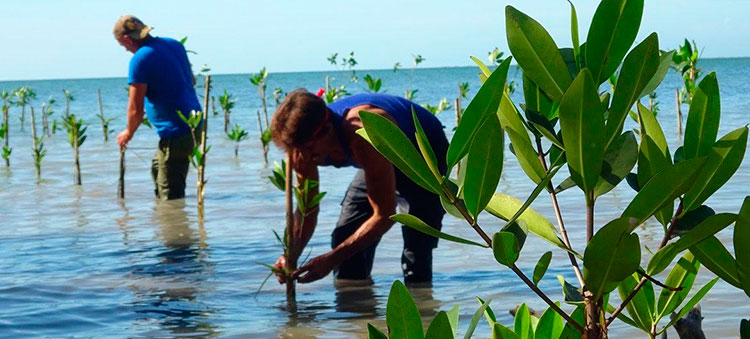
Actions that will contribute to minimize the impacts of climate change and improve the quality of life in settlements located in two stretches of the southern coast -planned to be executed during eight years of operation and 22 years of maintenance-, proposes the international project Mi Costa(My Coast).
In the medium and long term, it is expected to recover more than 15,000 hectares (ha) of coastal ecosystems, mainly mangroves, forests and marsh grasslands that will restore the functionality of wetlands, explained Sandra Loza Alvarez, PhD in Sciences, researcher at the Institute of Marine Sciences (Icimar by its Spanish acronym) and technical coordinator of the aforementioned global initiative.
In an exclusive interview for the Cuban News Agency, she said that direct interventions in La Coloma, Cajio Beach, Surgidero de Batabano, Jucaro, Florida Beach, Santa Cruz del Sur and Manzanillo will increase resilience to extreme hydrometeorological events in the most vulnerable communities of Cuba's southern coast.
She highlighted the rehabilitation of more than 11,000 hectares of mangrove forests as an important task that will provide a natural barrier with all the conditions to face strong winds and floods.
Mangroves, sea grasses and coral reefs, whose management is also part of the project's objectives, form a protective triad for coastal towns in the face of large-scale weather phenomena, by reducing the force of waves and, in the case of the former, they also reduce the intensity of winds and sea penetrations, he said.
Aware that fishing is one of the main economic activities and sources of income for the families located in these settlements, he stressed the importance of mangrove regeneration to provide a suitable habitat for numerous animals, including varieties of fish that find shelter and food in the roots of these plants.
Therefore, restoring coastal forests represents a guarantee for the development of fishing activities and the recovery of species that have declined considerably as a result of the deterioration of the ecosystem, explained the researcher from Icimar, a scientific center attached to the Environment Agency (AMA by its Spanish acronym) of the Ministry of Science, Technology and Environment (Citma by its Spanish acronym).
Fishing preservation implies maintaining an important source of employment, in addition to safeguarding one of the oldest and most valued cultural traditions in coastal settlements, but it will only be possible to the extent that the inhabitants assume attitudes consistent with the environment.
In the current circumstances, it is necessary to modify certain practices in order to avoid increasing vulnerabilities. For this reason, along with technical actions, training will be carried out in community centers that will be set up to transfer knowledge on how to deal with climate change.
Likewise, water management tasks will be carried out in order to provide the water required for the wetland to recover its conditions; therefore, this represents a facilitating action for the recovery of the mangroves, in addition to contributing to the improvement of this vital liquid for social consumption and economic activities.
The project's efforts are also aimed at reducing the effects of saline intrusion, which is favored by the rise in sea level and causes a deterioration in the quality of water reservoirs, an environmental problem that will be counteracted by recharging aquifers and restoring drainage to the coastal zone.
To the extent that mangrove forests are strengthened, they will be able to contain the penetration of the saline wedge and retain larger volumes of freshwater, thereby reducing salinity levels along the coast and creating ideal conditions for different forms of life.
Providing this liquid with higher quality to the local population improves health, solves one of the fundamental concerns of these communities and materializes the United Nations sustainable development goal related to access to drinking water, she emphasized.
Loza Alvarez explained that Mi Costa will generate new employment opportunities, mostly linked to forestry and monitoring activities in the areas that will benefit, where it is intended to incorporate women (currently dedicated to domestic work), thus enhancing their economic and social empowerment.
With the premise of not generating conflicts that affect the environment and its inhabitants, the project activated an environmental and social safeguards mechanism in the area to ensure the protection of natural resources and the interests of the community. Potential impacts must be identified and resolved in a timely and expeditious manner.
Mi Costa materializes nine of the tasks outlined in the Cuban State Plan to Confront Climate Change (Task Vida), circumstances that explain the interest in this project, which is financed by the government on the island and the Green Climate Fund, the latter processed through the United Nations Development Program.
Because of its relevance, this program involves strategic organizations such as Citma (represented by the AMA with Icimar), the National Institutes of Hydraulic Resources and Territorial and Urban Planning, the Ministries of Agriculture and Higher Education, as well as the Latin American Faculty of Social Sciences.
Approximately 1.3 million people living in seven settlements on the southern coast of Cuba and 24 municipalities will benefit from this initiative, which aims to increase climate resilience by implementing ecosystem-based adaptation solutions.
Sidebar

 Agencia Cubana de Noticias
Líder en información nacional
Agencia Cubana de Noticias
Líder en información nacional








Nos reservamos el derecho de no publicar los comentario que incumplan con las normas de este sitio